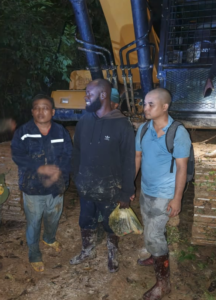
Snapshot of Godfred Yeboah Dame and Legal Team at the Court Complex
• Target Innocent Woman Instead!
A legal case in Techiman has taken a troubling turn, leaving many questioning the integrity of the justice system. What began as a straightforward transaction for 2,000 gallons of cooking oil has now spiraled into a baffling prosecution, one that sees the primary suspect walking free while two others, seemingly with little connection to the crime, are facing charges.
The case revolves around Margaret Ayim, a student of Kwame Nkrumah University of Science and Technology (KNUST), who placed an order for oil from Bawku-based supplier Yahaya Malik. The goods were delivered to a warehouse in Techiman, owned by Florence Abena Bempomaa, a friend of Ayim’s mother. But when the time came to settle the payment, it never materialized, leaving the supplier out of pocket and prompting him to seek justice through the Techiman Divisional Police.
Initial investigations appeared to build an airtight case. An itemized phone bill from MTN corroborated Malik’s claims, confirming that it was Ayim who had made the order. Arrests followed, including that of Ayim herself, as authorities moved quickly to resolve what seemed a clear-cut instance of fraud.
However, in a perplexing turn of events, the focus of the case has shifted dramatically. Despite her initial admission to placing the order, Ayim has now been exonerated and has even been positioned as a prosecution witness. Instead, her mother’s friend, Bempomaa, and another individual, Joyce Bempong, now find themselves in the dock, accused of orchestrating the fraudulent transaction—a claim for which there is no substantial evidence.
The sudden reversal has left many questioning the motivations behind the prosecution’s strategy. Critics have suggested that Ayim’s connections may have played a role in her exoneration, with suspicions mounting that this is a case of selective justice, designed to protect Ayim and her mother while scapegoating Bempomaa.
A resident close to the investigation expressed disbelief: “The evidence was clear—Ayim placed the order, and she admitted it. How can she now be a witness while Bempomaa is made out to be the culprit? This doesn’t make any sense.”
Bempomaa’s legal team is preparing to challenge the prosecution’s case, arguing that their client has been unjustly targeted and that Ayim should face trial for her admitted role in the transaction. “This is an extraordinary miscarriage of justice,” said a source close to the defense. “The authorities are prosecuting the wrong people, while those who are truly responsible are being shielded.”
As the case makes its way through the courts, the decision to shift blame away from Ayim has sparked widespread criticism of the regional prosecutors and the Attorney General’s office. Legal experts are calling for greater scrutiny of the case, with some warning that this may become a defining moment in the region’s judicial history.
The questions raised by this prosecution are profound: how can a suspect who initially admitted her role in the alleged crime be cleared, while others with seemingly little involvement face prosecution? As the trial progresses, all eyes will be on the courtroom, and the outcome may have lasting implications for public confidence in the legal system.
This case is no longer just about cooking oil—it has become a test of transparency, accountability, and the rule of law in Techiman.
Stay tuned as this explosive controversy continues to unravel!






